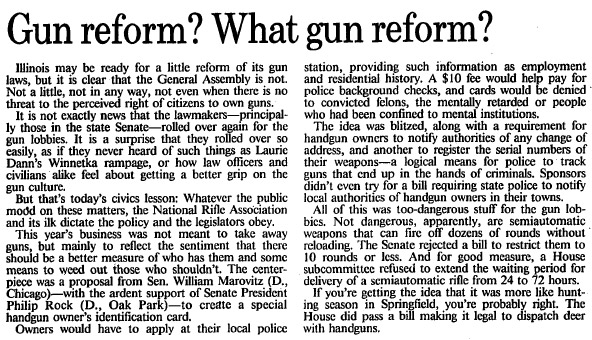In 1988, a school shooting was committed in a Winnetka elementary school by a 30-year-old woman named Laurie Dann—a woman from a well-off family who grew up in Pill Hill, Highland Park, and Glencoe, who struggled with increasingly out-of-control mental illnesses most of her life, whose father tried to get her voluntarily committed to a mental institution shortly before the shooting, but who could appear normal enough to be hired as a babysitter on the North Shore. She wounded five children and killed one.
After the tragedy, Mike Royko was asked to write about gun control. He couldn't bring himself to (Chicago Tribune, May 26, 1988).

Royko is spot on when it comes to how the NRA is successful. Their return on investment is weak, and while they spend a lot of money, it's thinly distributed.
The truth, however, is that while the NRA spends a good deal of money in total, that money is spread over so many races – well over 200 House races alone every election – that it has little more than symbolic effect. The typical NRA contribution to a House candidate is around $2,500, including both primary and general election contributions. At a time when a candidate in a competitive House race can expect to spend at least a million dollars and sometimes much more, this amount is insignificant – on average, less than two-tenths of one percent of an NRA recipient’s budget comes from the group.
What they're good at is putting the fear of God into politicians, such as the pervasive belief that the NRA cost Democrats the 1994 and 2000 elections:
A common theme recurs in analysis after analysis: what the NRA claims credit for usually turns out upon closer examination to be nothing more than elections in which Republicans do well. Every election follows a pattern. The NRA says this is the most important election ever, and mobilizes its resources to elect Republicans. If Republicans win, as they did in 1994 and 2000, the group says: See, we told you everything depends on us and our issue. If Democrats win, as they did in 2008 and 2006, the NRA is quiet.
What happened to gun control in Illinois after the Winnetka shootings? A lot of legislation was defeated in the state legislature, but we did get the rights to shoot deer with handguns (Chicago Tribune, June 3, 1989).




